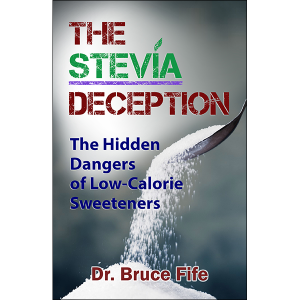Stevia May Not Be So Good After All
Warning: the information in this article may be objectionable to some readers blinded by marketing propaganda and misconceptions. Only those sincerely seeking the truth should consider reading further.
When I first learned about stevia years ago, I was excited. Finally, here was a sweetener derived from an herb rather than from some chemist’s laboratory. It was a product of nature and not of man, so it had to be good. Since it contained no sugar, it was believed to have no effect on blood sugar levels and could be safely used by diabetics. It was many times sweeter than sugar so you only needed a tiny amount to give foods the same sweetness as sugar but without all the calories. It seemed like a dieter’s dream.
Marketers promoted stevia as a natural, herbal sweetener that could help control blood sugar, ease sugar cravings, aid in weight loss, and improve digestive health. It had an exotic appeal because it was derived from a rare herb found only in the wilds of South America. Stevia took on the persona of a natural, wholesome sweetener that was a far healthier choice than sugar or artificial sweeteners.
I was whisked away by all the hype and believed, like many others, that stevia was a wholesome natural sweetener that promoted good health. Stevia was added to my diet at home and I encouraged others to use it in place of sugar or artificial sweeteners. I developed many recipes using it. However, I began to notice side effects with stevia that concerned me. I began to wonder if stevia was really as wholesome and healthy as promoters claim. This prompted me to look beyond the hype and delve into the science to uncover the facts. What I found shocked me! Much of the information we are told about stevia is more marketing hype than truth. The more I researched, the more I discovered that most of what we believe about stevia is simply not true—they’re myths and misconceptions created by promoters trying to sell a product.
Through my research, I have found many problems with stevia, more than I can include in this article, but I would like to highlight six major myths and give you the facts, all of which are verified by published medical studies and plain old common sense.
Myth 1: Stevia is Harmless Because it Comes from a Plant
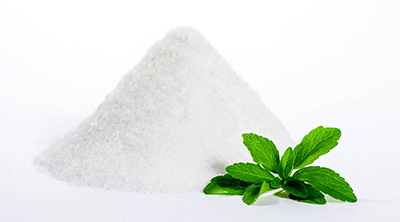
Herbs are natural, harmless, and often beneficial right? That’s the image marketers give us and we have fallen for that lie hook, line, and sinker. Just because something comes from a plant does not make it wholesome or harmless. There are many natural substances that are poisonous or otherwise harmful. Have you ever experienced the consequences of touching the leaf of a poison ivy plant or felt the pain of stinging nettle? Many poisons, such as cyanide and ricin, are derived from plants. Many dangerous drugs also come from plants. Simply because stevia is derived from a plant does not make it harmless, let alone healthful.
Myth 2: Stevia is an Herbal Sweetener
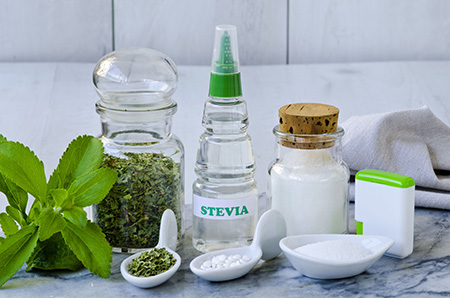
We’ve all been told that stevia is an “herbal” sweetener. Nothing can be further from the truth. The sweetener that is sold in stores shares no resemblance to the stevia plant. In fact, these sweeteners should not even be called stevia, but by their chemical names rebaudioside A and stevioside. It’s all a part of the misconception that stevia marketers use to deceive the public.
The stevia sweetener you buy in the store cannot be called an herb or even a natural product; it is a highly processed, refined, purified chemical. The sweetness of stevia comes from chemicals called steviol glycosides. In the refining process, all of the vitamins, minerals, antioxidants, essential oils, and other plant components are stripped away leaving purified steviol glycosides. Some manufactures purify their products into individual steviol glycosides, primarily rebaudioside A and stevioside.
Stevia is no more natural than is sugar or cocaine. Sugar is extracted and refined from sugar beets. Cocaine is extracted and refined from cocoa leaves. Likewise, stevia sweetener is extracted and refined from stevia leaves. To call stevia an “herbal” sweetener is like calling sugar a “vegetable” sweetener because it comes from beets.
Like sugar and cocaine, purified stevia extract forms a white crystalline powder. It has no resemblance to the original herb in any way, shape, or form. It is more like a drug than it is an herb. It’s most potent drug-like effect is its sweetness, which is 200 to 300 times sweeter than sugar.
Myth 3: Stevia is Not Addictive
One of the major problems with sugar is that it is addicting. In fact, studies have shown that it is just as, and even more addicting than cocaine. For example, when lab rats are given free access to both cocaine and sugar, they prefer sugar over cocaine. Even rats who are already addicted to cocaine quickly switch their addiction to sugar as soon as they are offered a choice.1
People, too, become addicted to sugar. That is one of the reasons why we have an obesity epidemic. Like cocaine, sugar triggers pleasure centers in the brain that drive us to eat sweets and encourage us to overindulge. Haven’t you ever eaten a piece of chocolate and then just had to have another and another? You just had to eat more even though you knew you had eaten enough. When you ignore sound judgment and make decisions based on cravings, you are addicted.
The addiction to sugar is not isolated to just sugar, but extends to all non-caloric sweeteners as well. It is not as much a “sugar” addiction as it is a “sweet” addiction. We become addicted to the sweetness rather than to sugar itself. Non-caloric sweeteners trigger the same pleasure centers in the brain that sugar does and causes the same cravings and addictions.
Researchers tested rats using saccharine, which is completely different chemically from sugar. The results were the same. The type of sweetener didn’t matter, it was the sweet taste that triggers the powerful effect, not the type of sweetener or the specific chemical makeup of the sweetener. Stevia has the same effect. When rats are given the choice between saccharine or stevia, their preference for stevia is just as strong as it is for saccharin.2
Addiction to stevia was one of the characteristics I first noticed. People would switch their addiction from sugar or aspartame to stevia once they began using it. Instead of eating desserts and junk foods sweetened with sugar, they were eating the same types of foods sweetened with stevia. And they had the same cravings for sweets. Stevia does not curb your sweet tooth at all, it feeds it, keeping sugar cravings and addictions alive and active.
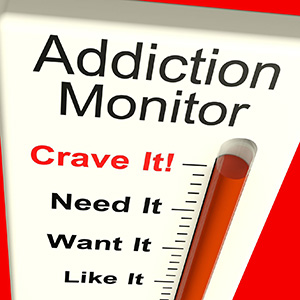
Myth 4: Stevia Aids in Weight Loss
Most people use stevia to eliminate the calories from sugar and reduce their total calorie consumption as a means to lose or maintain their weight. Yet, those people who use it are not very successful with weight loss, and those who do manage to lose weight, work very hard at it and must reduce their total calorie intake drastically, making their weight loss journey a constant, unpleasant struggle. The simple truth of the matter is that stevia and other non-caloric sweeteners do not aid in weight loss, but promote weight gain!
Studies show that when people add non-caloric sweeteners into their diets, they tend to gain weight, not lose it. This is clearly demonstrated with those people who drink diet sodas. This effect isn’t because people with weight problems tend to drink diet soda and so are more susceptible to weight gain. Even normal weight people who drink diet sodas gain weight more rapidly than those who drink the same amount of regular soda.3
Animal studies have proven that non-caloric sweeteners, in comparison to sugar, lead to greater total calorie intake, greater weight gain, and increased body fat deposition. Several large scale human studies have found the same thing.4 The type of non-caloric sweeter makes no difference; they all have the same weight promoting effect, including stevia.5
The reason for this is that sugar activates taste receptors on the tongue that relay messages to the brain and gastrointestinal tract to release hormones and prepare for the incoming sugar calories. When non-caloric sweeteners are consumed, they activate the same sweet taste receptors on the tongue and set into motion this same process. However, when the anticipated sugar calories don’t come, hunger is intensified, which encourages overeating and weight gain. There is also a metabolic effect. Sugar stimulates metabolism immediately after eating, non-caloric sweeteners do not. So after eating a meal containing non-caloric sweeteners, more of the calories are converted into fat and packed away in storage.6
Although non-caloric sweeteners all have different chemical properties, their effect on weight gain is the same. The reason has nothing to do with their chemical makeup, or whether they come from an herb or a laboratory, but has everything to do with their intense sweetness and their lack of calories. If weight loss is your goal, you would be better off consuming real sugar than you would stevia.
Myth 5: Stevia is Good for Digestive Health
The gastrointestinal (GI) tract is the home for trillions of microorganisms collectively called the gut microbiota. Some of these bacteria and yeasts are important to our health because they help digest food, produce vitamins, and support immune function, among other things. Some, however, are not so useful and if present in too large a number can disrupt the intestinal environment and wreak havoc on digestive function and overall health.
The overconsumption of sugar and sweets is believed to feed these potentially harmful microorganisms causing them to proliferate and disrupt the balance between the good and bad microbes. The theory is that replacing sugar with stevia will limit the amount of nourishment going to the bad bacteria, thus limiting their ability to grow and multiply, resulting in a healthier digestive tract. The major problem with this concept is the fact that both the so-called good and the bad microbes feed on the sugar and carbohydrates in the diet. So eliminating sugar “starves” the good bacteria just as much as the bad.
When you eat sugar, taste receptors trigger the release of hormones that prepare the GI tract for the incoming sugar calories. Non-caloric sweeteners produce the same response. After eating food containing non-caloric sweeteners, the GI tract is primed to receive an incoming load of sugar. When the anticipated sugar calories do not arrive, changes occur that cause a shift in the bacterial population in an unhealthy direction.
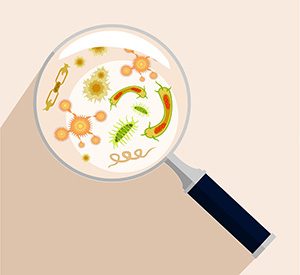
More than 90 percent of the bacterial species in the gut comes from just two major subgroups—Firmicutes and Bacteroidetes. The percentage of these two types of bacteria greatly influences a person’s weight. Obese people have 50 percent more Firmicutes and 50 percent fewer Bacteroidetes than normal weight people. Firmicutes are better adapted to breaking down foods and extracting nutrients, which causes a higher percentage of calories to be removed from digesting food. They also influence genes causing a higher rate of these calories to be converted into fat and stored in the body.7 For this reason, some people refer to Firmicutes as the obesity bacteria. The more Firmicutes you have living in your gut, the more likely you are to be overweight or obese.
Studies have clearly demonstrated that consuming non-caloric sweeteners increases Firmicutes and decreases Bacteroidetes populations in the gut, thus promoting obesity.8 Researchers can take fecal samples from obese mice and transplant them into normal weight mice and cause them to become obese as well. They can also cause normal weight mice to become obese by feeding them food containing non-caloric sweeteners in place of sugar. The same thing occurs in humans. All non-caloric sweeteners, including stevia, have this effect.
Stevia disrupts the normal gut environment leading to metabolic changes that promote weight gain and alters normal digestive function.
Myth 6: Stevia is Good for Diabetics because it Does Not Affect Blood Sugar
You would think that replacing sugar, that strongly affects blood glucose levels, with a non-caloric sweetener, which has little effect, would be of benefit to diabetics. For this reason, stevia has been promoted as a better choice than sugar for diabetics. While stevia has little effect on blood sugar levels directly, its long-term effects greatly increases the risk of insulin resistance and diabetes.
Most non-caloric sweeteners, including stevia, are not easily broken down or digested. This is the reason why they do not provide any calories. This may sound good to people who want to reduce their calorie intake, but it causes a serious problem. When glucose enters the digestive tract it triggers the release of hormones that aids in its digestion and assimilation, as a consequence, glucose is quickly absorbed and removed from the intestines. This is why it has such a dramatic effect on raising blood sugar levels.
Stevia, and other non-caloric sweeteners, also trigger the release of these same hormones. However, since non-caloric sweeteners do not break down, they are not readily absorbed. They remain in the digestive tract for extended periods of time and continually trigger the release of hormones needed to process glucose.9 While eating stevia does not have much of an effect on blood sugar levels, it does exert an enormous effect within the GI tract. As stevia travels down the GI tract it continues to activate glucose receptors. Consequently, it has the same effect in the GI tract as that of downing massive quantities of glucose. This huge hormonal influx and corresponding lack of sugar calories causes changes in microbiota colonies, alters pH, disrupts insulin regulation, causes metabolic dysfunction, and promotes weight gain, leading to insulin resistance and an increased risk of developing diabetes. If someone is not diabetic, stevia use can make them more susceptible to developing it, if a person is prediabetic it can push them into full-blown diabetes, if they are already diabetic, it can make their condition even worse.
Stevia should never be used by anyone who is diabetic or who is concerned about becoming diabetic.
Now that you have the facts about stevia, you can make an informed choice whether to use it or not. This article only touches on some of the major problems with stevia and other non-caloric sweeteners. When you look at all of the evidence, it is revealed that stevia promotes weight gain, GI disorders, and diabetes to a greater extent than sugar does. If you would like a more detailed report with accompanying references to studies, I highly recommend you read my book The Stevia Deception: The Hidden Dangers of Low-Calorie Sweeteners. ♦
References
- Magalle, L., et al. Intense sweetness surpasses cocaine reward. PLoS One 2007;8e698.
- Sciafani, A, et al. Stevia and saccharin preferences in rats and mice. Chem Senses 2010;35:433-443.
- Fowler, SP, et al. Fueling the obesity epidemic? Artificially sweetened beverage use and long-term weight gain. Obesity (Silver Spring) 2008;16:1894-1900.
- Blum JW, et al. Beverage consumption patterns in elementary school aged children across a two-year period. J Am Coll Nutr 2005;24:93–98.
- Swithers, SE, et al. High-intensity sweeteners and energy balance. Physiol Behav 2010;100:55-62.
- Yang, Q. Gain weight by “going diet?” Artificial sweeteners and the neurobiology of sugar cravings. Yale J Biol Med 2010;83:101-108.
- Ley, RE, et al. Microbial ecology: Human gut microbes associated with obesity. Nature 2006;444:1022-1023.
- Suez, J, et al. Artificial sweeteners induce glucose intolerance by altering the gut microbiota. Nature 2014;514:181-186.
- Mace, OJ, et al. Sweet taste receptors in rat small intestine stimulate glucose absorption through apical GLUT2. J Physiol 2007;582(Pt 1):379-392.
by Dr. Bruce Fife

